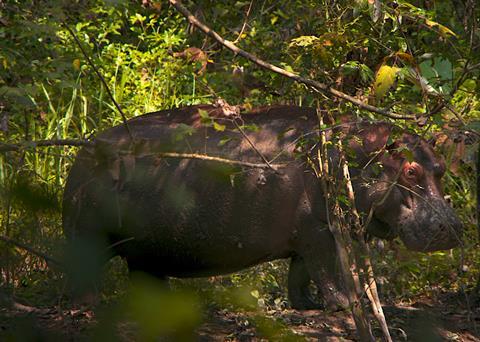A deceased hippo narrates this inventive, freewheeling fable from the Dominican Republic

Dir/scr: Nelson Carlos de los Santos Arias. Dominican Republic/Namibia/Germany/France. 2024. 123mins
The sad story of one of Pablo Escobar’s ‘Cocaine Hippos’ – Pepe, the film’s posthumous narrator, is a descendent of the hippos that the drug lord imported illegally in the late 1970s for his private zoo – is explored inventively and tangentially in this playful picture from Nelson Carlos de los Santos Arias.
A gleefully wanton approach to form, style and story
This freewheeling fable pieces together the circumstances leading to Pepe’s death – he is the first and only hippopotamus to have been killed in the Americas. It’s a wildly original work from De Los Santos Arias, a film with a gleefully wanton approach to form, style and story in which no directorial decision is predictable, and, despite a slightly overstretched running time, no moment is ever dull.
This is the second feature from de los Santos Arias, following his fiction debut Cocote, which won prizes in Locarno and Mar Del Plata. One of the buzzier titles in Berlin’s competition, Pepe would be a film of interest for programmers and distributors on the strength of its highly distinctive premise, even if the execution didn’t live up to expectations – how many films, after all, are narrated by a dead hippo musing on the very concept of language? But Pepe is a witty and singular talking point picture, one which has the potential to stand out in the crowded arthouse theatrical market and which, despite its defiantly idiosyncratic storytelling, has break-out potential.
Pepe speaks in several languages during the picture (the animal’s voice is provided by Jhon Narváez, Fareed Matjila, Harmony Ahalwa and Shifafure Faustinus), and in a mellifluous, rumbling tone that teeters on cartoonish absurdity. He knows two things for certain: that he belongs in a place called Africa, and that he is dead. The two certainties are connected. Pepe, we learn, is a descendent of two of the original three hippos imported on Escobar’s coke-fuelled whim. The population had already swelled to eighteen animals by the time that Pepe was born (following the death of Escobar, the hippos were left to their own devices and have subsequently become a successful invasive species and a thorny issue for conservationists, ecologists and the Colombian government).
For Pepe, however, the broader environmental implications of his existence are of secondary importance. His main concern is his nemesis – his brother Pablito (named, due to his ruthless and deadly reign of terror, after his late owner). Pablito usurped his and Pepe’s father as the dominant male in the herd and soon clashed with Pepe, driving him into exile in the Magdalena River basin. There Pepe starts to cause consternation among the local river community. Fisherman Candelario (Jorge Puntillón García) gets a lucrative drinking story out of his encounter with a huge beast that might be a log, a steer or an alligator, but earns nothing but disdain from his wife Betania (Sor María Ríos), who long ago branded him as a liar.
The domestic friction between Betania and Candelario is just one of the looping digressions of this meandering but endlessly fascinating journey. De los Santos Arias takes Pepe’s story as the spine of the narrative, but explores each chapter in the most oblique and unexpected way possible, widening out the film as a commentary on colonialism. A scene in a bus full of tourists on safari in Namibia is played for laughs, but lands several unexpectedly powerful blows in its depiction of first-world ignorance and dismissal of local knowledge. The hippo, explains the Namibian tracker wearily, as the German tourists guffaw, is traditionally believed to warn of “bad things”.
He is not wrong. During the Magdalena River section, we somehow find ourselves following a regional beauty pageant, one of the more audacious segues that has little to do with hippos, but which adds to the rich and idiosyncratic oddness of the film. And a linking device, a kids’ cartoon featuring a bumbling, accident-prone hippo, is a reminder that fantasy and exuberant silliness are not solely the domain of children’s cinema.
Budgetary constraints and the challenges of imposing a narrative on footage of wild hippos are evident at times – several scenes play out with black or white screens, with just the consistently impressive sound design to guide us. But elsewhere the film looks terrific, with a visual wit and mischief evident in the framing; part of the initial journey of Escobar’s original hippos is shown through a lovely shot of three dangling crates at the very top of the frame, hanging from unseen helicopters.
De los Santos Arias is refreshingly promiscuous when it comes to the look of the film, switching allegiance between widescreen and academy ratio, black and white and lush, verdant colour. Ultimately, it’s a film that refuses to be pinned down and which consistently defies expectations. Pepe is crammed, perhaps even overstuffed, with ideas, but which, like the huge beasts at the heart of the story, is deceptively agile and light on its feet.
Production company: Monte & Culebra
Contact: pepetravels4@gmail.com
Producers: Pablo Lozano, Tanya Valette, Nelson Carlos De Los Santos Arias
Cinematography: Camilo Soratti, Roman Lechapelier, Nelson Carlos De Los Santos Arias
Editing: Nelson Carlos De Los Santos Arias
Production design: Daniel Rincón, Melania Freires
Music: Nelson Carlos De Los Santos Arias
Main cast: Jhon Narváez, Sor María Ríos, Fareed Matjila, Harmony Ahalwa, Jorge Puntillón García















![[L-R]: Amanda Villavieja, Laia Casanovas, Yasmina Praderas](https://d1nslcd7m2225b.cloudfront.net/Pictures/274x183/6/4/1/1471641_pxl_20251224_103354743_618426_crop.jpg)








